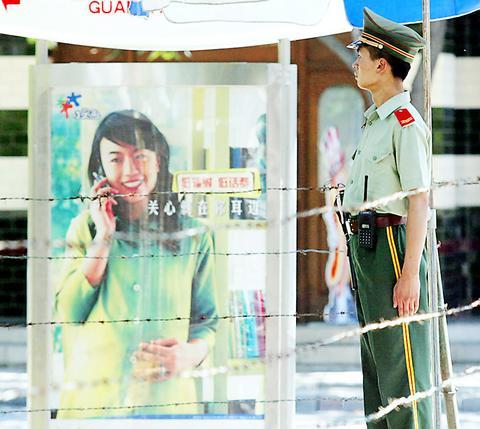China has issued new regulations on the filtering of mobile phone short-text messages in a move that expands its censorship controls over wireless technologies and the Internet, state press said yesterday.
The "Self-Discipline Standards on Content in Mobile Short Messaging Services" were issued recently and are aimed at weeding out pornographic, fraudulent and illicit messages, Xinhua news agency reported.
The standards provide the framework for China Mobile Corp, the country's largest mobile phone service provider, to contract out the policing and filtering of short messages for content deemed unhealthy or fraudulent, the report said.

PHOTO: AP
So far 10 such companies have begun the policing work in 20 categories of content that are spelt out in an earlier agreement or "treaty" on content between the government and Internet Service Providers.
China maintains some of the toughest Internet regulations in the world and has reportedly up to 30,000 people policing the Internet for subversive political content and pornography.
"Cyber-dissidents" who post political views on the Internet that are opposed to official Communist Party views are routinely rounded up and jailed for subversion.
According to the Paris-based Reporters Without Borders, the new short-messaging regulations could further lead to the crackdown on political dissidents sending messages via mobile short messages.
"The Chinese authorities are making ever greater use of new technology to control the circulation of news and information. In the past months we have been witnessing a real downturn in press freedom particularly on the Internet," the group said in a statement.
"The international community should react against this hardening by the Chinese regime," the statement said.
It said that instant text messaging helped expose the governments attempts to cover up the SARS outbreak last year.
According to the group, the Chinese firm Venus Info Tech Ltd, has already begun to filter mobile phone messages for key words to pinpoint "reactionary" text senders.
"Its surveillance system would allow it to home in on `false political rumors' and `reactionary remarks' among others," Reporters Without Borders said, citing a press release from the company.
According to Xinhua, over 220 billion text messages were sent in China last year, making up some 55 percent of the world's text messages.

SECURITY: As China is ‘reshaping’ Hong Kong’s population, Taiwan must raise the eligibility threshold for applications from Hong Kongers, Chiu Chui-cheng said When Hong Kong and Macau citizens apply for residency in Taiwan, it would be under a new category that includes a “national security observation period,” Mainland Affairs Council (MAC) Minister Chiu Chui-cheng (邱垂正) said yesterday. President William Lai (賴清德) on March 13 announced 17 strategies to counter China’s aggression toward Taiwan, including incorporating national security considerations into the review process for residency applications from Hong Kong and Macau citizens. The situation in Hong Kong is constantly changing, Chiu said to media yesterday on the sidelines of the Taipei Technology Run hosted by the Taipei Neihu Technology Park Development Association. With

CARROT AND STICK: While unrelenting in its military threats, China attracted nearly 40,000 Taiwanese to over 400 business events last year Nearly 40,000 Taiwanese last year joined industry events in China, such as conferences and trade fairs, supported by the Chinese government, a study showed yesterday, as Beijing ramps up a charm offensive toward Taipei alongside military pressure. China has long taken a carrot-and-stick approach to Taiwan, threatening it with the prospect of military action while reaching out to those it believes are amenable to Beijing’s point of view. Taiwanese security officials are wary of what they see as Beijing’s influence campaigns to sway public opinion after Taipei and Beijing gradually resumed travel links halted by the COVID-19 pandemic, but the scale of

A US Marine Corps regiment equipped with Naval Strike Missiles (NSM) is set to participate in the upcoming Balikatan 25 exercise in the Luzon Strait, marking the system’s first-ever deployment in the Philippines. US and Philippine officials have separately confirmed that the Navy Marine Expeditionary Ship Interdiction System (NMESIS) — the mobile launch platform for the Naval Strike Missile — would take part in the joint exercise. The missiles are being deployed to “a strategic first island chain chokepoint” in the waters between Taiwan proper and the Philippines, US-based Naval News reported. “The Luzon Strait and Bashi Channel represent a critical access

Pope Francis is be laid to rest on Saturday after lying in state for three days in St Peter’s Basilica, where the faithful are expected to flock to pay their respects to history’s first Latin American pontiff. The cardinals met yesterday in the Vatican’s synod hall to chart the next steps before a conclave begins to choose Francis’ successor, as condolences poured in from around the world. According to current norms, the conclave must begin between May 5 and 10. The cardinals set the funeral for Saturday at 10am in St Peter’s Square, to be celebrated by the dean of the College